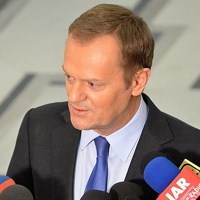When it joined the European Union in May 2004, Poland was experiencing troubled times. Although its GDP growth was satisfying—5.4 percent in 2004, compared to 3.9 percent last year—its unemployment rate had hit 20 percent. Instead of perceiving EU membership as a chance to boost living standards, many Poles thought membership would widen the gap between Poland and the West. Thousands left the country seeking jobs abroad, mainly in Germany, Britain and Ireland.
Populist parties exploited these fears. Ahead of presidential and parliamentary elections in 2005, they based their campaigns on euroskepticism and protection of national interests. Lech Kaczynski, the main leader of the center-right, was elected president. (He died in a plane crash in 2010.) His twin brother Jaroslaw began serving as prime minister in 2006.
The Kaczynskis’ foreign policy strongly focused on NATO and relations with the U.S. One of Lech Kaczynski’s first acts after taking office in December 2005 was to extend the Polish mission in Iraq, reversing a decision of the previous center-left government—which had backed the U.S. intervention in 2003—to withdraw it in early 2006. The Kaczynskis also decided to boost Poland’s contribution to the NATO-led mission in Afghanistan, while backing the deployment of U.S. missile-defense systems to Poland, despite the opposition of a majority of Poles.

